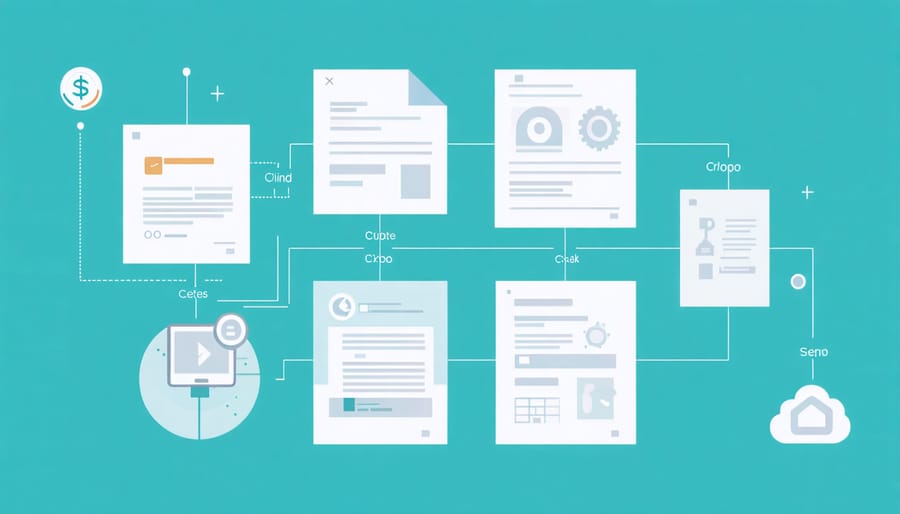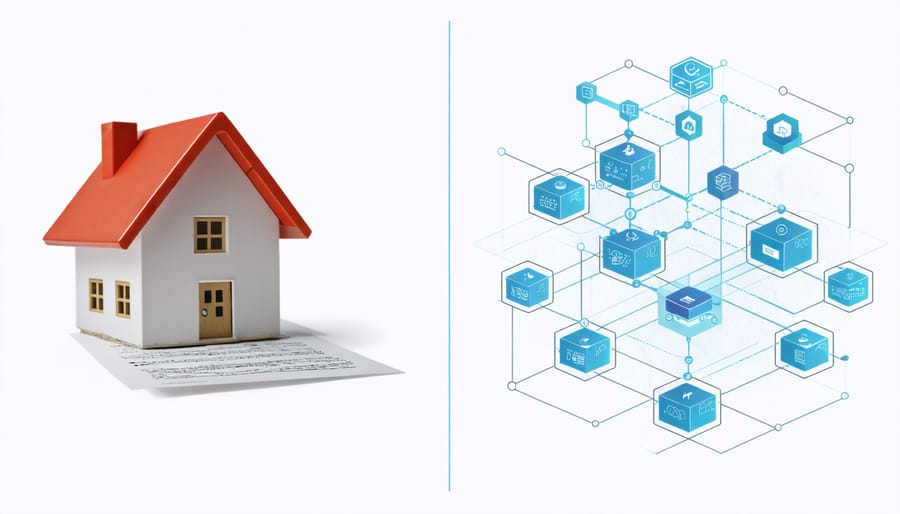Blockchain technology is fundamentally transforming real estate transactions, creating unprecedented opportunities for property developers, investors, and industry professionals. Blockchain technology in property development has already enabled over $1.4 billion in tokenized real estate assets, demonstrating its potential to revolutionize traditional property management systems.
Smart contracts now automate complex property transactions, reducing closing times from months to days while eliminating intermediary costs. Leading development firms have reported 40% reductions in administrative overhead through blockchain implementation, with enhanced security and transparency across their operations. These innovations extend beyond simple property transfers, encompassing everything from construction supply chain management to tenant verification systems.
The convergence of blockchain with Internet of Things (IoT) sensors and artificial intelligence is creating intelligent building management systems that optimize asset performance in real-time. Forward-thinking developers are leveraging these integrated solutions to transform how properties are bought, sold, and managed, establishing new standards for efficiency and transparency in the real estate sector.
This technological revolution represents a critical inflection point for construction professionals and property managers who must adapt to remain competitive in an increasingly digitized market.

Smart Contracts Revolutionizing Property Transactions
Automated Lease Management
Blockchain technology is revolutionizing lease management by introducing smart contracts that automate and secure tenant agreements. These digital contracts, operating on blockchain platforms, are transforming traditional property management automation systems into transparent, efficient processes.
Smart contracts automatically execute predefined terms, handling rent collection, security deposits, and maintenance requests without intermediary involvement. When a tenant initiates a payment, the system verifies the transaction and updates the ledger instantaneously, reducing administrative overhead and eliminating payment disputes.
Leading property management firms report up to 40% reduction in administrative costs after implementing blockchain-based lease management. The technology creates an immutable record of all transactions and agreement modifications, providing both landlords and tenants with a verified history of their interactions.
Security features inherent to blockchain protect sensitive tenant information while enabling authorized parties to access necessary documentation. The system can automatically trigger maintenance requests, process rental increases, and manage lease renewals based on predefined conditions.
Integration with IoT devices allows for automated utility monitoring and billing, while digital identity verification streamlines tenant screening processes. This technological convergence creates a seamless ecosystem where property managers can oversee multiple properties efficiently, reducing operational complexity while enhancing tenant satisfaction.
Digital Property Rights Management
Blockchain technology has revolutionized real estate ownership management through digital property rights systems and asset tokenization. This transformation enables property owners to convert physical real estate assets into digital tokens, representing fractional ownership on a secure, immutable ledger.
Through tokenization, real estate assets become more liquid and divisible, allowing investors to purchase portions of properties rather than entire buildings. Smart contracts automate ownership transfers, reducing administrative overhead and eliminating the need for multiple intermediaries in property transactions.
The digital verification systems built on blockchain provide tamper-proof records of ownership history, title transfers, and property documentation. These systems maintain a permanent, transparent record of all transactions and ownership changes, significantly reducing the risk of fraud and disputes.
Several pioneering projects have implemented successful tokenization platforms. For instance, the Harbor platform has tokenized a $20 million student housing complex, while RealT has enabled fractional ownership of residential properties through blockchain-based tokens.
The technology also facilitates compliance with regulatory requirements through programmed smart contracts that automatically enforce legal restrictions and ownership rules. This automated compliance reduces legal risks and ensures proper transfer procedures are followed.
For construction professionals and property developers, these systems offer streamlined property management, reduced transaction costs, and enhanced security in ownership records. The integration of blockchain-based property rights management represents a significant advancement in real estate asset administration and trading capabilities.
Leading Real Estate Blockchain Implementations
Commercial Property Management Platforms
Enterprise-level blockchain solutions are revolutionizing commercial property management through comprehensive platforms that integrate multiple stakeholders and streamline operations. These systems leverage distributed ledger technology to create transparent, efficient, and secure property management ecosystems.
Leading platforms like IBM’s Hyperledger Fabric and R3’s Corda have been adapted for commercial real estate applications, offering features such as automated lease management, smart contract implementation, and real-time payment processing. These enterprise solutions typically include modules for tenant relationship management, maintenance scheduling, and financial reporting, all secured through blockchain technology.
A notable implementation is the Commercial Real Estate Blockchain Alliance (CREBA) platform, which has demonstrated significant improvements in property management efficiency. According to recent case studies, participating properties have reported a 40% reduction in administrative overhead and a 60% decrease in payment processing time.
Key features of these enterprise platforms include:
– Automated compliance and regulatory reporting
– Smart contract-enabled lease agreements
– Real-time financial reconciliation
– Digital identity management for tenants and vendors
– Integrated maintenance work order systems
– Transparent audit trails for all transactions
The adoption of these platforms requires careful consideration of implementation costs, integration with existing systems, and staff training requirements. However, the long-term benefits often justify the initial investment, with ROI typically realized within 18-24 months of deployment.
Security remains a paramount concern, and enterprise blockchain platforms address this through advanced cryptographic protocols and permissioned access controls. Many systems employ multi-signature requirements for critical transactions and maintain comprehensive audit logs that are immutable and easily accessible.
Looking ahead, these platforms are expected to incorporate artificial intelligence and IoT integration, enabling predictive maintenance and automated building management systems. Early adopters are already seeing the benefits of reduced operational costs, improved tenant satisfaction, and enhanced property value through better management practices.
For property management firms considering implementation, it’s essential to evaluate vendor track records, integration capabilities, and scalability requirements before selecting a platform.

Residential Property Management Systems
Blockchain technology is revolutionizing residential property management by streamlining operations, enhancing security, and improving transparency across various processes. Property managers and owners are increasingly adopting blockchain-based solutions to address traditional challenges in tenant screening, rent collection, maintenance tracking, and contract management.
Smart contracts have emerged as a cornerstone of blockchain implementation in residential property management. These self-executing contracts automatically enforce lease terms, process rental payments, and manage security deposits without intermediaries. For instance, leading property management firms have reported a 40% reduction in administrative overhead after implementing smart contract systems.
The technology also enables secure digital identity verification for tenants and property owners. Through blockchain-based identity management systems, property managers can conduct faster, more reliable background checks and maintain an immutable record of tenant history. This approach has significantly reduced fraud risks and streamlined the tenant screening process.
Maintenance management has been transformed through blockchain-based work order systems. These platforms create transparent, time-stamped records of maintenance requests, contractor responses, and completion status. Property managers report improved contractor accountability and reduced dispute resolution time by up to 60%.
Several innovative features of blockchain-based property management systems include:
– Automated rent collection and payment distribution
– Real-time financial reporting and transparency
– Decentralized document storage and verification
– Integrated IoT device management for smart home features
– Automated utility billing and consumption tracking
Property managers implementing blockchain solutions have reported significant improvements in operational efficiency. Case studies indicate a 30% reduction in payment processing times and a 25% decrease in administrative costs. Additionally, tenant satisfaction scores have improved by an average of 35% due to increased transparency and faster response times.
Looking ahead, the integration of blockchain with artificial intelligence and IoT devices promises even greater automation and efficiency in residential property management. Early adopters are already experimenting with predictive maintenance systems and automated tenant communication platforms built on blockchain infrastructure.

Integration Challenges and Solutions
Technical Infrastructure Requirements
Implementing blockchain technology in real estate projects requires a robust technical foundation comprising several critical components. At its core, the infrastructure must include a distributed network of nodes, each maintaining a synchronized copy of the blockchain. These nodes require high-performance servers with substantial processing power and storage capacity to handle transaction validation and smart contract execution.
The system architecture typically consists of three main layers: the blockchain protocol layer, the smart contract layer, and the application interface layer. Each project must implement appropriate digital security measures through cryptographic protocols and consensus mechanisms to ensure data integrity and transaction validity.
Essential hardware requirements include dedicated servers with minimum specifications of 16GB RAM, multi-core processors, and solid-state drives with at least 1TB storage capacity. The network infrastructure must support high-bandwidth connections with minimal latency to facilitate real-time transaction processing and data synchronization across nodes.
Software components should include blockchain development frameworks, smart contract development tools, and APIs for integration with existing property management systems. Organizations must also maintain backup systems, monitoring tools, and disaster recovery protocols to ensure continuous operation of the blockchain network.
Cloud-based solutions can provide scalability and reduce initial infrastructure costs, though organizations should carefully evaluate vendor lock-in risks and data sovereignty requirements when choosing between on-premises and cloud deployments.
Regulatory Compliance Considerations
Real estate blockchain projects must navigate a complex regulatory landscape that varies significantly across jurisdictions. In the United States, the Securities and Exchange Commission (SEC) closely monitors tokenized real estate offerings, often classifying them as securities under the Howey Test. This classification requires projects to either register with the SEC or qualify for exemptions under Regulation D or Regulation A+.
Smart contracts and digital property transfers must comply with existing property laws and recording requirements. Many jurisdictions still mandate physical documentation and traditional recording methods, necessitating hybrid solutions that bridge blockchain technology with conventional legal frameworks.
Data privacy regulations, such as GDPR in Europe and CCPA in California, impose strict requirements on how personal information is stored and processed on blockchain networks. Real estate projects must implement appropriate data protection measures and ensure compliance with these regulations, particularly when handling sensitive tenant or transaction information.
Anti-Money Laundering (AML) and Know Your Customer (KYC) requirements remain crucial considerations. Blockchain platforms must incorporate robust verification processes while maintaining the technology’s efficiency benefits. Additionally, tax authorities are developing new frameworks to address cryptocurrency and token-based real estate transactions, requiring careful consideration of tax implications and reporting obligations.
Projects should engage legal experts familiar with both blockchain technology and real estate law to ensure compliance while maintaining operational efficiency. Regular audits and updates to compliance protocols are essential as regulations continue to evolve alongside technological advancement.
Future Outlook
The trajectory of real estate blockchain projects points toward increasingly sophisticated applications and wider industry adoption. Industry experts predict that by 2025, blockchain technology will fundamentally transform the future of property management through enhanced transparency and efficiency.
Smart contracts are expected to become more advanced, incorporating AI and IoT integration for automated property operations. These developments will enable real-time monitoring of building systems, predictive maintenance scheduling, and autonomous lease management. Industry leaders anticipate that tokenization of real estate assets will gain mainstream acceptance, allowing for fractional ownership and increased market liquidity.
Emerging trends suggest blockchain platforms will evolve to address current scalability challenges, with new consensus mechanisms optimized for real estate transactions. Environmental considerations are driving the development of energy-efficient blockchain solutions, particularly important for large-scale property portfolios.
Construction professionals should prepare for the integration of blockchain with Building Information Modeling (BIM) systems, creating immutable records of construction processes and material sourcing. This convergence will enhance project transparency and facilitate more efficient dispute resolution.
Regulatory frameworks are expected to mature, providing clearer guidelines for blockchain implementation in real estate. Industry stakeholders are working with authorities to establish standards for smart contracts and digital property rights, which will accelerate adoption rates.
The next wave of innovation will likely focus on interoperability between different blockchain platforms, enabling seamless communication across various property management systems and creating a more connected real estate ecosystem.
Blockchain technology represents a transformative force in property management, offering unprecedented opportunities for transparency, efficiency, and security. As demonstrated throughout this analysis, successful implementation requires careful consideration of technical infrastructure, regulatory compliance, and stakeholder engagement. Property management professionals should begin by identifying specific pain points in their operations that blockchain could address, such as transaction verification, contract management, or tenant screening processes.
Moving forward, industry leaders should focus on developing comprehensive implementation strategies that include staff training, technology integration plans, and clear ROI metrics. The adoption of blockchain solutions should be approached as a phased process, starting with pilot programs in specific operational areas before expanding to larger-scale applications.
Key action items include conducting thorough assessments of existing systems, establishing partnerships with reputable blockchain solution providers, and creating detailed transition plans that minimize disruption to ongoing operations. Success in blockchain adoption will ultimately depend on maintaining a balance between innovation and practical implementation, while ensuring compliance with evolving regulatory frameworks.
By embracing blockchain technology thoughtfully and strategically, property management professionals can position themselves at the forefront of industry innovation while delivering enhanced value to stakeholders.

